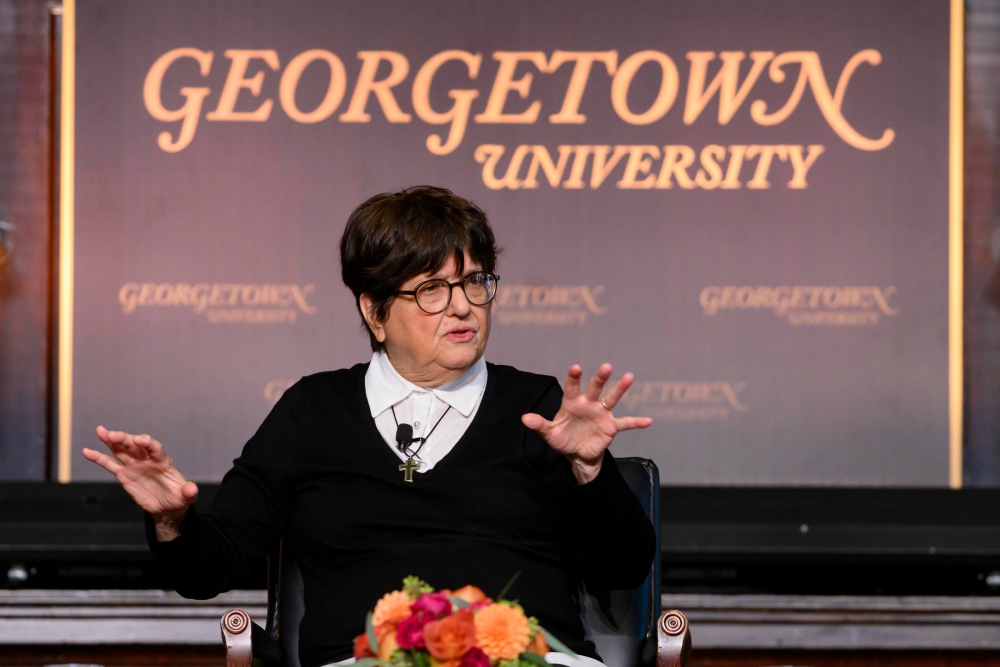
St. Joseph Sr. Helen Prejean responds to questions at Georgetown University in Washington, D.C., Sept. 16. (Georgetown University/Phil Humnicky)
St. Joseph Sr. Helen Prejean has hope.
Her hope is rooted in her own conversion experience. It's rooted in her decadeslong work against the death penalty and in watching public opinion shift against the practice over time.
She sees hope today despite the serious injustices in the United States and the church because she knows how change happens.
"It's all about the waking-up," Prejean told a packed house of more than 400 people Sept. 16 at Georgetown University. "And we wake each other up. I believe in the goodness of people."
Speaking about her new biography, River of Fire, for a public dialogue followed by a book signing, Prejean discussed her own experience waking up to the realities of poverty and systemic racism and her frustration with "crass" theological reasoning for oppressive immigration policies and the sexism of women's role in the Catholic Church.
The conversation was part of Georgetown's Faith and Culture series and was moderated by Paul Elie, author and senior fellow at Georgetown's Berkley Center for Religion, Peace and World Affairs.
In her Louisiana accent, Prejean enthusiastically and repeatedly encouraged the audience to continue to have important conversations that can "wake each other up" and inspire action.
"How do people awaken? You bring the reality to them through story and through giving them the information," she said.
Prejean presented both story and information, drawing from the contents of her new memoir, which NCR columnist Franciscan Fr. Daniel Horan described as "the story behind the story — how the devout schoolteacher and aspiring mystic grew into her vocation, which took her behind bars and into the world of America's inhumane pseudo-justice system in order to bring the compassionate face of Christ to those least sympathetic in our society."
Prejean told the audience that when she was a young nun, there were two "cabs" sisters could belong to: a social justice cab and a spiritual cab. Prejean said she was in the "spiritual cab" that consisted primarily of praying for others rather than taking direct action. She said she was not virtuous but "protected" and needed to be awakened to her socioeconomic and racial privileges.
Her awaking moment that showed her she needed to get out of the spiritual cab came at a conference where a professor of sociology and the New Testament from Emmanuel College in Boston said: "Integral to the good news to people who are poor — it's not God's will for them to be poor. They have a right to struggle for what is rightfully theirs."
This moment of understanding, including realizing she didn't actually know any people who lived in poverty, led Prejean to move into the St. Thomas housing projects in New Orleans. It was there she saw up close the realities of poverty and systemic racism. She also learned the value of education, to help us "find out who we are and what our gifts are so that we can be an agent in the world."
"When we're ready, God wakes us up, and we wake each other up," Prejean told the audience. "What I learned about the death penalty: It's not that the American people are evil and really want to see people executed, but we're ignorant. We don't see it. If somebody can bring it to us out of compassion, then we can wake up."
Prejean said that in 1994, around the time Dead Man Walking — her first book, which was made into a movie starring Susan Sarandon — came out, 80% of the American public thought the death penalty was "a good idea. In the South, it was 90%."
Advertisement
In 2016, Pew Research Center found support for the death penalty reached a four-decade low, with 49% favoring the death penalty for people convicted of murder. That number has since risen to 54%, according to a report released in June 2018.
Prejean drew on her experience advocating against the death penalty to weigh in on other modern injustices she said go against her faith, like the treatment of immigrants at the border. She specifically mentioned how some politicians use "crass theology" to justify their actions by referencing Romans 13 without understanding the background context of that passage: Paul trying to protect the Jews from being ousted from Rome in a contentious historical moment.
"I hate to see the way Christianity is being used by politicians to uphold torture, to uphold death, to uphold separation of children from their parents," she said. "And what's the counter to it? People who will witness, people who will speak out. ... We have the experiences that give us the moral authority to speak out the truth of what we have seen, what we have heard and what our hearts understand."
When asked about women's role in the church, another issue Prejean is passionate about, she once again pushed the audience to speak out against injustice as she did in a letter addressed to Pope Francis at the end of her new book. She that women are also part of the church and should participate as agents in conversations about its direction.
"What I said to the pope in the letter was, 'We don't have a role in the health of the Catholic Church. You have all males, the only ones sitting around the tables making policy decisions. It's not good for all males to be doing all that. You need women,' " she said.
Sticking with her positive message for the night, Prejean concluded with more words of hope before heading to her book-signing station.
"Look at what's happening. Look out over the horizon. Can you see the wheat coming up? Can you see the new crop of justice arising? Can you see the number of people going to the border? The number of young people becoming lawyers, becoming human rights lawyers, working to free people that shouldn't be incarcerated [and] juveniles sent to prison for life? Look. Can you see the hope rising? And can you be a part of that?"
[Jesse Remedios is an NCR Bertelsen intern. His email is [email protected].]





